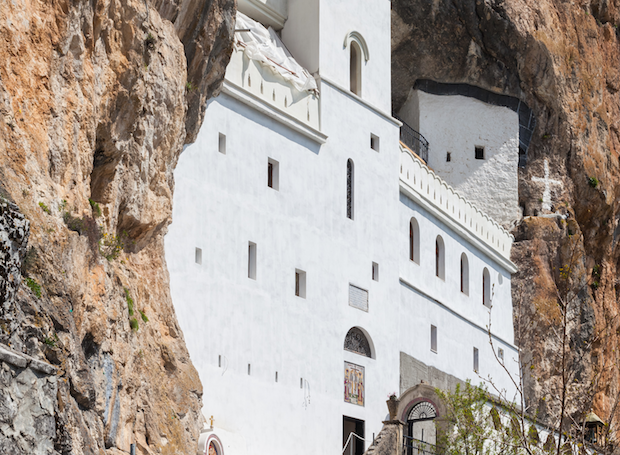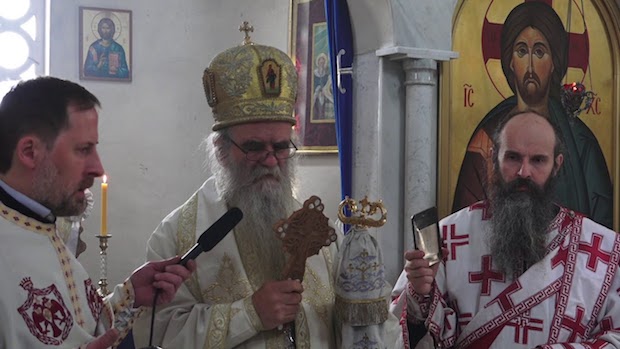For the first time in Montenegro's history, the ruling party has lost its majority due to a confrontation with the Orthodox Church. Evangelical Christian Danijel Petkovski analyses the current situation in this small Balkan country.
![A Montenegrin flag flying over the town of Kotor, Montenegro. / [link]Wladislaw Peljuchno[/link], Unsplash CC0.](https://cms.evangelicalfocus.com/upload/imagenes/5f9bef398b7f8_wladislawpeljuchno.jpg) A Montenegrin flag flying over the town of Kotor, Montenegro. / [link]Wladislaw Peljuchno[/link], Unsplash CC0.
A Montenegrin flag flying over the town of Kotor, Montenegro. / [link]Wladislaw Peljuchno[/link], Unsplash CC0.
When Montenegro's government passed the Religious Freedom Law at the end of 2019, there were protests outside the parliamentary building and the pro-Serbian opposition MPs attempted to boycott the vote.
That turned into a year-long confrontation that has led to the first defeat of the party that has ruled Europe's youngest country since its independence from Serbia in 2006.
“Vote for the saints and against anarchy”, Bishop Amfilohije of the Serbian Orthodox Church pointed out, as he placed his ballot in a box in front of a crowd of cameras on 30 August.
It was the first time he had voted in his 82 years of life and, a sign that the elections were expected to be different. And they were, because the Democratic Party of the Socialists (DPS) lost its parliamentary majority.
The DPS won the elections but with only 35% of the vote, which was insufficient compared to the 32.5% of the main opposition coalition, 'For the Future of Montenegro', which with other opposition parties holds a total of 41 seats out of the 81 that make up the Montenegrin Parliament.
“We respect the democratic rules”, the President of Montenegro, Milo Djukanovic just said, but he also accused Serbia of interfering “reviving Serbian nationalism”. These accusations have been rejected in the neighbouring country.
The opposition of the Serbian Orthodox Church was decisive in the result of the elections, which had a turnout over 75%, surpassing the one in the 2006 independence referendum, which was around 68%.
“People understood it in a very simple way, as a plebiscite on whether they were in favour of the Serbian Orthodox Church or the government”, Danijel Petkovski, a Montenegrin evangelical Christian told Spanish news website Protestante Digital in an interview.
The leader of the opposition coalition, Zdravko Krivokapic, has been appointed Prime Minister by President Djukanovic and has been commissioned to form a new government.
The new Religious Freedom Law required the Serbian Orthodox Church to change its name in the country to be more representative of different ethnic groups.
“People are increasingly divided between Serbs and Montenegrins. Some Serian nationalists parties said that Montengro was building its identity on an anti-Serbian basis and that is a problem”, Petkovski explained.
Another point that has specially concerns the Serbian Orthodox Church has been the request of the previous government to demonstrate the origin of its architectural and cultural heritage.
“The church Serbian Orthodox has been very active. They publically say that if the citizens love the church they should know for whom not vote”, Petkovski pointed out.
The inclusion of all these points in the Religious Freedom, has led the Orthodox Church to mobilise a so far dormant electorate, in a country where more than 74% of the population identify as Christian, and 91% of them Orthodox, according to Christian organisation Joshua Project.
You can read the whole interview below.

Question. How do you assess the latest elections in Montenegro?
Answer. I think it was good, because it brings back hope to people. Many have lost hope that they can change anything by voting, because the government always had the same people, just changing the positions. The same political party has been rulling about 30 years in Montenegro. The last elections make people believe that if everybody get involved, they can actually change something.
This is a small country, it doesn’t take much to control or manipulate the voting, so that , in the past, only those who were really interested in politics, went out to vote. In these latest elections, around 75% voted, which is higher than the percentage of the population that voted in the independence referendum.
The independence referendum was a really big issue to see if Montenegro was going to step out of the EU or not, and the same thing has happened now.
People understood it in a very simple way, as a plebiscite on whether they were in favour of the Serbian Orthodox Church or the government. Many people have interpreted the new rule as an attempt by the government to control the Church, its decisions, its properties and its name.
The government said that the church cannot be named as Serbian Orthodox Church, because this only covered one ethnic group so that they wanted the church to change its name.
They also wanted the Church to prove with what money it had built all its buildings, and if the money had come from the State, sothat they could defend that all those buildings were State property.
Q. Has this provoked much opposition from the Serbian Orthodox Church?
A. Reading between the lines, the government had a problem with the name of the church and also with the control of its properties, not only the land or the ancient monasteries of the IX or X century, but also the cultural heritage.
The church has many very valuable paintings and relics. The country had no authorization over the cultural heritage of Montenegro, so that it cannot decide about it. Additionally, the church has a lot of properties ont the coast, where the government wants to built hotels, tourist resorts.
On the other hand, the ruling party has been accused of corruption by many people, as well as by the EU. They have been controlling the judicial, health and educational system, placing its people everywhere, even though they are not great experts in those fields. For exemple, we had a minister of Agriculture that was not an expert on that area.
So far, they have controlled the major institutions of the country, but the church is a big entity that they have no controlled, which has been an opposition to the government all the time.
The elections have divided the population because it was as if they were being asked what they love most, Montenegro or the Church. You could hear people in the streets asking: ‘do you fear God or the president?’.
The church has been very active. They publically say that if the citizens love the church they should know for whom not vote. For the first time, the governemnt has changed by the willing of people and this has brought back hope that some things could change.
Q. How do the evangelical churches see the elections?
A. Basically, the Religious Freedom Law was ok for us. Evangelical didn’t exist here 25 years ago, when the first evangelical church started in the country. Evangelical christianity in Montengro is very young and people are still confused. Many think that there are only Catholics and Orthodoxs and they don’t want to hear anything about Protestants.
People don’t consider evangelical Christianity as a religious denomination. The new law gives us many freedoms. We already had some with the law of 1973, but this one makes some things easier, such as official registration, legal responsibility and the resolution of some issues.
The Serbian Orthodox Church do have problems with the law, such as the obligation to prove the origin of the properties they hold, because, how can you prove something that happened 200 years ago? The Orthodox Church said that they are older than the state and they did not have to register anything. For Catholics and Muslims, this was not a problem.
Not many evangelicals have spoken out on this issue. Each person has voted according to his or her conscience. Evangelicals have not had a unified opinion because there are different views in the churches.

Q. What are the challenges that evangelicals in Montenegro are facing right now?
A. I don’t think anything is going change for the evangelicals in the country. We have freedom to act, to organise events. I don’t know yet what the new government is going to do.
Some say that they will change the points of the law related to the Serbian Orthodox Church, in order to have peace and unity in the country, where about 68% of the population are Orthodox. The challenges that may arise in relation to this issue do not really affect us.
Q. Is the change of government a positive fact for evangelicals in the country?
A. In general, I think the change of the government is great. We will have to wait and see how positive it is for the evangelicals. It’s too early.
The good thing about the previous government was that they opposed the Serbian Orthodox Church. They treated all denominations equally, because the Orthodox have always had a special treatment as the biggest denomination in the country, and the former government didn’t want that, which was good for us as evangelicals.
The new goverment is made up of three parties, two of them have a very strong secular leading, so I don’t think that situation would change.
Q. How is the situation between the different ethnic groups in Montenegro, especially between Serbs and Montenegrins?
A. Over the past two years the situation has been good, but we can feel that the dividing line has became thicker and people are increasingly divided between Serbs and Montenegrins.
It all has to do with which part of the story you want to relate to. Maybe you have a brother who says that we will be always Serbs ethnically but we are Montenegrins geographically. And the other brother may say that he does not feel like a Serb and he wants to be Montenegrin.
That dividing line has became stronger partly because the previous governement tried to present the Serbs as the enemies of the country. There are a few Serbian nationalist parties that try to reject all the decisions that Montengro has been making, to try to join the European Union or to have its own flag, for example.
They said that Montengro was building its identity on an anti-Serbian basis and that is a problem. I don’t think that is healthy, because it has confronted the population, I hope people will overcome that and will learn to enjoy their own identity.
Identity is the main problem in the Balkans, specially in the countries that came out ofthe former Yugoslavia. Who we are and what makes us who we are. People usually turn to history. But the choice cannot really define you. This requires changes in people's mentality, not just in the law. It is a complex issue.
Q. How can we pray for Montenegro?
A. Among the majority of the population living in Montenegro there is a big ignorance about evangelicals, because we are very small. Of the few evangelicals in the country, only the half are locals, the rest are missionaries or people who came to live here. There are five evangelical churches registered in the country.
People have some prejudices about evangelicals because they have never heard about them. Pray for that and pray that our situation will not get worse with the new government.
Pray that we can use this moment to speak to the people and that we will not be afraid to make ourselves known.

Las opiniones vertidas por nuestros colaboradores se realizan a nivel personal, pudiendo coincidir o no con la postura de la dirección de Protestante Digital.
Si quieres comentar o